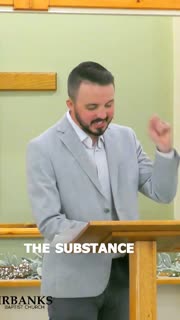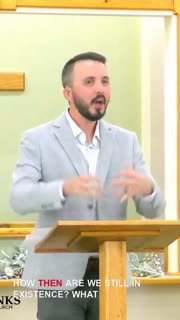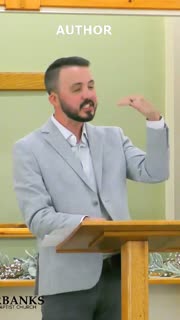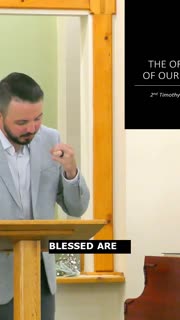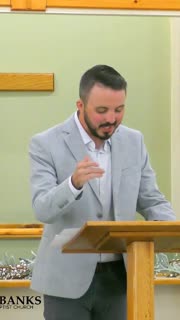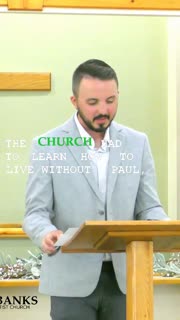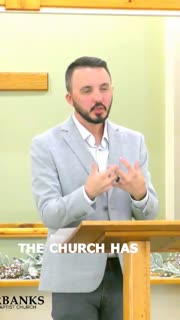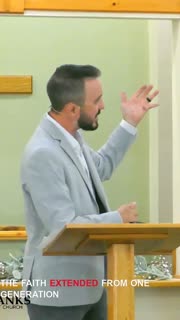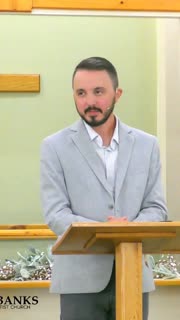Honoring the Enduring Legacy of Faith
Summary
In today's sermon, we delved into the profound message of honoring the faith once given, as outlined in 2 Timothy. This message is particularly poignant as we celebrate the 196th anniversary of Fairbanks Baptist Church, a testament to the enduring legacy of faith passed down through generations. We explored three key aspects of this faith: its origin, its lineage, and the judgment of our faith.
The origin of our faith is rooted in the Word of God, as Paul instructs Timothy to "hold fast the pattern of sound words" (2 Timothy 1:13-14). This faith is not based on human wisdom but on the divine revelation given through the Holy Spirit. We examined how Jesus' words to Thomas in John 20:29, "Blessed are those who have not seen and yet have believed," encapsulate the essence of our faith. This faith is further reinforced by Paul's exhortation in Romans 10:14-17, emphasizing that faith comes by hearing the Word of God.
The lineage of our faith is a fragile yet resilient chain, passed down from one generation to the next. Paul highlights this in 2 Timothy 1:15-18, where he speaks of those who have turned away and those who have remained faithful. This lineage is not without its challenges, as seen in the early church's struggles during Paul's imprisonment. Yet, it is through the perseverance of individuals like Onesiphorus and Timothy that the faith has endured. This serves as a reminder of the importance of each generation's commitment to preserving and passing on the faith.
Finally, we considered the judgment of our faith, not in terms of our sins, which have been atoned for by Christ, but in terms of our faithfulness. Paul speaks of the Bema Seat of Christ, where believers will be judged for their faithfulness and rewarded accordingly (2 Timothy 1:18). This judgment is a call to remain steadfast in our faith, to hold fast to the sound words, and to live a life that honors the faith once given.
### Key Takeaways
- The Origin of Our Faith: Our faith is rooted in the Word of God, delivered through the Holy Spirit. Paul urges Timothy to "hold fast the pattern of sound words" (2 Timothy 1:13-14), emphasizing that our faith is not based on human wisdom but on divine revelation. This faith is encapsulated in Jesus' words to Thomas, "Blessed are those who have not seen and yet have believed" (John 20:29). [07:38]
- The Fragility and Resilience of Faith's Lineage: The lineage of our faith is a fragile chain passed down through generations. Paul highlights this in 2 Timothy 1:15-18, where he speaks of those who have turned away and those who have remained faithful. This serves as a reminder of the importance of each generation's commitment to preserving and passing on the faith. [16:48]
- The Judgment of Our Faith: Believers will be judged not for their sins, which have been atoned for by Christ, but for their faithfulness. Paul speaks of the Bema Seat of Christ, where believers will be judged and rewarded for their faithfulness (2 Timothy 1:18). This judgment is a call to remain steadfast in our faith and to live a life that honors the faith once given. [25:47]
- The Role of the Church in Preserving Faith: The church plays a crucial role in preserving and passing on the faith. Fairbanks Baptist Church, celebrating its 196th anniversary, is a testament to this enduring legacy. The church's commitment to the gospel and the Word of God has ensured its continued existence and purpose. [15:06]
- The Call to Faithfulness: Each believer is called to remain faithful and to hold fast to the sound words of the gospel. This faithfulness is not only a personal commitment but also a communal responsibility, as each generation is tasked with passing on the faith to the next. This call to faithfulness is a reminder of the importance of living a life that honors the faith once given. [28:41]
### YouTube Chapters
[0:00] - Welcome
[01:17] - Introduction to Lessons for the Last Days
[02:58] - Prayer and Thanksgiving
[04:37] - Honoring the Faith Once Given
[06:00] - The Origin of Our Faith
[07:38] - Hold Fast to the Word of God
[09:11] - The Substance of Faith
[12:11] - Faith Comes by Hearing
[13:38] - The Word of God as the Author of Our Faith
[15:06] - The Lineage of Our Faith
[16:48] - The Fragility of Faith's Chain
[18:32] - The Church's Struggles and Perseverance
[20:00] - The Remnant of Faithful Believers
[21:28] - The Importance of Each Generation's Commitment
[22:57] - Remembering Faithful Members
[24:30] - The Judgment of Our Faith
[25:47] - The Bema Seat of Christ
[27:43] - The Call to Faithfulness
[28:41] - Living a Life that Honors the Faith
[29:34] - The Truth of the Gospel
[30:29] - Closing Prayer
Study Guide
### Bible Study Discussion Guide
#### Bible Reading
1. 2 Timothy 1:13-14: "Hold fast the pattern of sound words which you have heard from me, in faith and love which are in Christ Jesus. That good thing which was committed to you, keep by the Holy Spirit who dwells in us."
2. John 20:29: "Jesus said to him, 'Thomas, because you have seen Me, you have believed. Blessed are those who have not seen and yet have believed.'"
3. Romans 10:14-17: "How then shall they call on Him in whom they have not believed? And how shall they believe in Him of whom they have not heard? And how shall they hear without a preacher? And how shall they preach unless they are sent? As it is written: 'How beautiful are the feet of those who preach the gospel of peace, who bring glad tidings of good things!' But they have not all obeyed the gospel. For Isaiah says, 'Lord, who has believed our report?' So then faith comes by hearing, and hearing by the word of God."
#### Observation Questions
1. What does Paul instruct Timothy to do with the "pattern of sound words" in 2 Timothy 1:13-14? [07:38]
2. In John 20:29, what does Jesus say about those who believe without seeing?
3. According to Romans 10:14-17, what is the process by which faith comes to a person?
4. How does Paul describe the lineage of faith in 2 Timothy 1:15-18? [16:48]
#### Interpretation Questions
1. Why is it significant that Paul tells Timothy to "hold fast" to the pattern of sound words? What might be the consequences of not doing so? [07:38]
2. How does Jesus' statement to Thomas in John 20:29 relate to the concept of faith in the modern church?
3. What does Romans 10:14-17 suggest about the role of preaching in the development of faith? How does this apply to the church's mission today?
4. How does the fragility and resilience of faith's lineage, as described in 2 Timothy 1:15-18, impact our understanding of the church's history and our role in it? [16:48]
#### Application Questions
1. Paul emphasizes the importance of holding fast to the Word of God. What are some practical ways you can "hold fast" to the sound words in your daily life? [07:38]
2. Jesus commends those who believe without seeing. Reflect on a time when you had to trust in God without tangible evidence. How did that experience strengthen your faith? [10:36]
3. Romans 10:14-17 highlights the importance of preaching for the development of faith. How can you support or participate in the preaching and teaching ministries of your church?
4. The lineage of faith is described as both fragile and resilient. What steps can you take to ensure that you are effectively passing on your faith to the next generation? [16:48]
5. Paul speaks of the judgment of our faithfulness at the Bema Seat of Christ. How does this future judgment motivate you to live a life that honors the faith once given? [25:47]
6. The sermon mentioned the role of the church in preserving faith. How can you contribute to the church's mission of preserving and passing on the faith? [15:06]
7. Reflect on the call to faithfulness. What specific actions can you take this week to demonstrate your commitment to the faith and to encourage others in their faith journey? [28:41]
Devotional
Day 1: The Divine Origin of Our Faith
Our faith is not a product of human wisdom but is rooted in the divine revelation given through the Holy Spirit. Paul instructs Timothy to "hold fast the pattern of sound words" (2 Timothy 1:13-14), emphasizing that our faith is based on the Word of God. This divine origin is further encapsulated in Jesus' words to Thomas, "Blessed are those who have not seen and yet have believed" (John 20:29). This faith is reinforced by Paul's exhortation in Romans 10:14-17, which emphasizes that faith comes by hearing the Word of God. The origin of our faith is a reminder that it is not something we create or manipulate but something we receive and hold onto with reverence and commitment.
[07:38]
Hebrews 11:1-3 (ESV): "Now faith is the assurance of things hoped for, the conviction of things not seen. For by it the people of old received their commendation. By faith we understand that the universe was created by the word of God, so that what is seen was not made out of things that are visible."
Reflection: How can you actively "hold fast" to the Word of God in your daily life? What specific steps can you take to ensure that your faith remains rooted in divine revelation rather than human wisdom?
Day 2: The Fragility and Resilience of Faith's Lineage
The lineage of our faith is a fragile yet resilient chain passed down through generations. Paul highlights this in 2 Timothy 1:15-18, where he speaks of those who have turned away and those who have remained faithful. This lineage is not without its challenges, as seen in the early church's struggles during Paul's imprisonment. Yet, it is through the perseverance of individuals like Onesiphorus and Timothy that the faith has endured. This serves as a reminder of the importance of each generation's commitment to preserving and passing on the faith. The resilience of our faith's lineage is a testament to the enduring power of God's Word and the steadfastness of His people.
[16:48]
Psalm 78:4-7 (ESV): "We will not hide them from their children, but tell to the coming generation the glorious deeds of the Lord, and his might, and the wonders that he has done. He established a testimony in Jacob and appointed a law in Israel, which he commanded our fathers to teach to their children, that the next generation might know them, the children yet unborn, and arise and tell them to their children, so that they should set their hope in God and not forget the works of God, but keep his commandments."
Reflection: Think about the ways in which you can contribute to the resilience of faith's lineage. How can you actively participate in passing on the faith to the next generation?
Day 3: The Judgment of Our Faith
Believers will be judged not for their sins, which have been atoned for by Christ, but for their faithfulness. Paul speaks of the Bema Seat of Christ, where believers will be judged and rewarded for their faithfulness (2 Timothy 1:18). This judgment is a call to remain steadfast in our faith, to hold fast to the sound words, and to live a life that honors the faith once given. The judgment of our faith is not something to fear but an opportunity to reflect on our commitment and dedication to living out the gospel in our daily lives.
[25:47]
1 Corinthians 3:12-15 (ESV): "Now if anyone builds on the foundation with gold, silver, precious stones, wood, hay, straw—each one's work will become manifest, for the Day will disclose it, because it will be revealed by fire, and the fire will test what sort of work each one has done. If the work that anyone has built on the foundation survives, he will receive a reward. If anyone's work is burned up, he will suffer loss, though he himself will be saved, but only as through fire."
Reflection: Reflect on your daily actions and decisions. Are they building a foundation of faithfulness that will withstand the test of time? What changes can you make to ensure that your life honors the faith once given?
Day 4: The Role of the Church in Preserving Faith
The church plays a crucial role in preserving and passing on the faith. Fairbanks Baptist Church, celebrating its 196th anniversary, is a testament to this enduring legacy. The church's commitment to the gospel and the Word of God has ensured its continued existence and purpose. The role of the church is not just to maintain traditions but to actively engage in the mission of spreading the gospel and nurturing the faith of its members. This commitment to the gospel is what sustains the church and allows it to be a beacon of hope and faith in the community.
[15:06]
Ephesians 4:11-13 (ESV): "And he gave the apostles, the prophets, the evangelists, the shepherds and teachers, to equip the saints for the work of ministry, for building up the body of Christ, until we all attain to the unity of the faith and of the knowledge of the Son of God, to mature manhood, to the measure of the stature of the fullness of Christ."
Reflection: How can you contribute to the church's mission of preserving and passing on the faith? What specific actions can you take to support your church's commitment to the gospel and the Word of God?
Day 5: The Call to Faithfulness
Each believer is called to remain faithful and to hold fast to the sound words of the gospel. This faithfulness is not only a personal commitment but also a communal responsibility, as each generation is tasked with passing on the faith to the next. This call to faithfulness is a reminder of the importance of living a life that honors the faith once given. It is a call to action, to be diligent in our spiritual practices, and to be a living testimony of God's grace and truth in our daily lives.
[28:41]
2 Peter 1:5-8 (ESV): "For this very reason, make every effort to supplement your faith with virtue, and virtue with knowledge, and knowledge with self-control, and self-control with steadfastness, and steadfastness with godliness, and godliness with brotherly affection, and brotherly affection with love. For if these qualities are yours and are increasing, they keep you from being ineffective or unfruitful in the knowledge of our Lord Jesus Christ."
Reflection: In what areas of your life do you need to grow in faithfulness? What practical steps can you take today to ensure that you are living a life that honors the faith once given?
Quotes
### Quotes for Outreach
1. "The substance of faith, having not yet seen, but yet trusted in the one whom we have not seen. And Paul understood this. And that's why he charged the church to act out this very substance of faith." [12:11] (14 seconds)
2. "How then are we still in existence? What is still our purpose? How from the timing of just shortly 50 years after America's founding, when Fairbanks Baptist Church came into existence in 1828 to today, when America has changed in culture and society and the industrial revolution and all these things in the world just running at a fast pace, how come we are still consistently in existence? Because we have held fast to those sound words." [15:06] (32 seconds)
3. "The word of God is the author of our faith, the substance of our faith. It outlines of whom our faith needs to be given to. It is the origin of our faith, the word of God. My dear believer, hold fast to it." [13:38] (17 seconds)
4. "Blessed are those who have not seen and yet have believed. This is the substance of the faith at which you and I have carried. This is the part of the church age that has now began from the moment that phrase began, that came out of the words of Christ to the moment of his ascension." [10:36] (20 seconds)
### Quotes for Members
1. "Paul uses the words, hold fast. Timothy, you need to hold tightly that which has been entrusted to you. There's an opportunity for you to lose it. There's an opportunity for you to misunderstand what you're holding. We're not talking about salvation here. Because he's not saying, hold fast to your salvation. He follows the phrase, the pattern of sound words. Hold fast what has been committed to you." [07:38] (34 seconds)
2. "The church had to learn how to live without Paul, and I'm glad she did. Many abandoned the faith, yet there was a remnant, Onesiphorus, who blessed Paul, who continued to be with Paul. Timothy, we know, still stuck it out. He didn't give up the ministry. In fact, he died, I think it was in 97 or 98 AD, if history is right. Through persecution. Thirty years, even after Paul was beheaded, Timothy stayed the course." [20:00] (29 seconds)
3. "The church has been centered on the gospel, and the gospel has been sent and charged for the last 2,000 years. And so long as the church stands on the gospel, we continue to go forth in our purpose. That brings into mind not simply the origin of our faith, but it even gives picture to the lineage of our faith, the lineage of our faith." [15:06] (27 seconds)
4. "The faith extended from one generation to the next generation as a link in each in an entire chain. But it was not always so strong. The chain of faith, the lineage of faith is so fragile, not because of we serve a fragile God, but because God's instruments are fragile creatures." [16:48] (25 seconds)
5. "How faithful you stay to the one that saved you. What you did with the faith that was given to you. That the chain of faith is ever so fragile warns no surprise that the Lord has set in a place. That the Lord has set in a place of peace. That there is a time of judgment on the church's faith." [26:47] (19 seconds)
